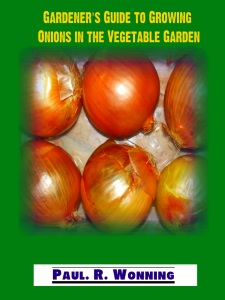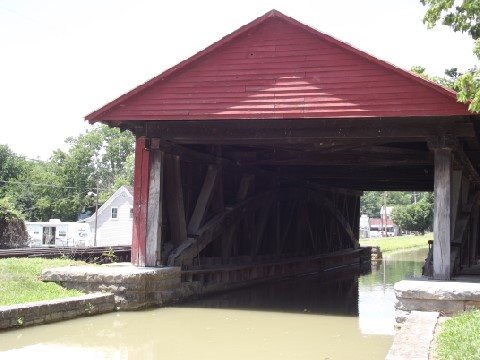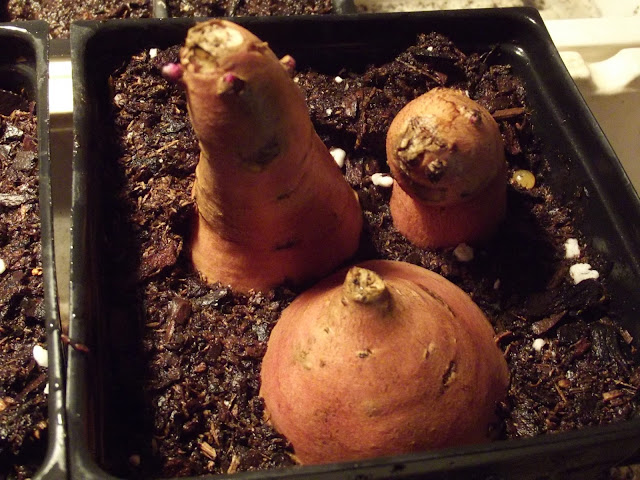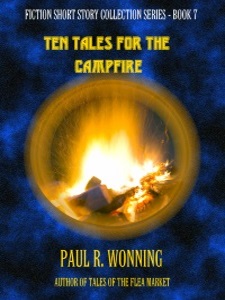The Skull Garden
Paul R. Wonning
Her garden was beginning to grow, the tips of the skulls just emerging from the forest mould. The Skull Tender glided, soundless, over the dried leaves, waiting. The forest was quiet and she was impatient. The time of harvest was nearing. Her eyes and ears scanned the forest in the gathering evening gloom. There was no sound or movement to gladden her senses. There was still time. She would wait.
Craig Nunn shouted to his mother, "I am going to hunt puff-balls, mom."
"Okay, Craig. Just make sure you are home before it gets dark," his mother said.
"I will Mom," Craig said as he darted out the door.
Craig loved his mom's fried puffballs. The shortening days of autumn signaled that soon the puffballs would be emerging from the forest soil. Recent rains ensured that there would be a good crop this year and Craig knew the places to hunt them. He entered the forest and went straight to his favorite spot. His eyes roved the ground in disappointment. There were puffballs here but they were still too small. It would be a couple of days before he could harvest them.
He continued his search to a couple of more spots that had always provided some. The story was the same in both those spots. He glanced at the creek that flowed through the woods. The damp bottoms provided the best habitat for the puffballs. Downstream led into a part of the forest he had not visited before. He paused, undecided. The sun lay low on the horizon, casting long shadows across the leaf-carpeted floor. Clumps of white snakeroot and zigzag goldenrod glowed in the evening light.
He plunged ahead. He wouldn't go far and maybe he would at least find a new patch of puffballs. A clump of green briar blocked his path, so he climbed higher up the hill that bordered the small creek. At the top, he paused. It was a high bluff that afforded a wonderful view of the valley of the small creek. Just a bit further along he could see a small glade along the creek. It looked like a promising spot, so he skirted a sinkhole and began a slipping, sliding descent down the steep hill. Once more on the creek bank, he followed it until he came to the glade.
Craig's heart skipped a beat. He could see the white tips of the puffballs beginning to emerge from the soil. He moved among them. This was a big patch, bigger than any he had ever seen. They were also different. Most of the puffballs started as small, white globes, their white tips pushing their ways out of the rich forest soil. These were bigger. Much bigger. He stooped to examine one closer. These were not ready yet, but in a few days they would be. His mouth watered. These would be much nicer than what he usually found. The darkening shroud of night warned him that it was time to go home. Once he had been on the woods after dark and he did not care to repeat the experience.
The distant bark of coyotes broke the forest's silence and it sped his steps along. In a couple of days, he would return for a bumper crop of puffballs.
Rains overnight awakened all the fragrances of the forest. Craig grasped the pillowcase in his hand as he traipsed into the woods. He was eager for the puffballs. The pungent smell of them as they fried in the pan wafted across his memory. Only once a year was this treat available, in the early fall when the delectable fungi emerged from the forest floor. He found his favorite bed. They were now ready, spurred into growth by the cool autumn rain and the warm sunshine.
He knelt and began picking them, dropping them one by one into the pillowcase. When he had picked as many as he needed for a meal, he stopped. Craig remembered the new bed of big ones that lay further into the woods. He followed the creek, now gurgling with the merry song of its rain freshened flow.
A few minutes of scampering up and down the forested hills brought him to the place. He stopped. These puffballs were huge. They looked just like a field of skulls. He decided, since these appeared different from the others, to try just one. He pulled a second pillowcase from his pocket and walked to the middle of the puffball patch. One nice one nestled in the leaves at his feet. He bent to inspect it. There were no holes or gashes to indicate insect activity. That was odd. He straightened up and looked over the patch. Puffballs were a favorite food of box turtles and other denizens of the forest. It was strange that a bounty of food of this size remained untouched by any animals, insects or birds.
He knelt again and put his hands on the puffball. As he touched it, the puffball moved. Craig fell back in surprise. It was a skull. Two hollow black eyes stared at him. The blackness of the eyes was as a limitless void. Craig tried to stand. His knees, weak with fear, betrayed him. The eyes disappeared. A puffball remained. Was it an illusion?
"He has seen you," a voice from behind him said in a voice that grated like fingernails on a blackboard.
Craig jumped to his feet and turned. A figure, cloaked in black, stood peering at him. The sun, breaking through a gap in the tree leaves, broke with radiance across the figure, hiding its face. If the figure had a face. Craig could not discern one.
"He has seen you," the figure repeated. "He will not forget you."
Craig dropped his sack of puffballs and ran. The voice followed him as he fled.
"He has seen you and he will come for you. On the night of the spirits, he will seek you. Be ready."
The figure filled the forest with its shrieking laughter that added further fuel to Craig's feet. Once he tripped over a fallen tree branch and he tumbled head over heels down a hill. After picking himself up, he continued his flight through the puffball patches. He ignored them as his fear propelled him on. A sharp stitch in his side did not slow him. He finally emerged from the forest into his yard. He collapsed on the cool green grass. His breath returned after many minutes.
After he rested, Craig sat up. He felt foolish. That couldn't have occurred. It was the product of an overzealous imagination. He considered going back into the woods for the puffballs he had discarded. Then he remembered where he had dropped them. He quailed inside. He would not return. He could not return. He would tell his mother that he dropped them accidentally into the creek, ruining them.
The words of the creature haunted him. That thing would not forget him. He would seek him out on the night of spirits. What did that mean?
Craig went into the house. He had never been afraid of the woods. Now he was.
The Skull Tender watched as the boy fled. Let him run. He could not get away. Not now that the Skull Master had peered into his soul. There was no escape. There would be a bountiful harvest for the garden this year.
In the days of this tale, it was common for the children to form small groups in costume on Halloween. These groups dispersed into the streets at night to spread their own brand of terror across the town. Going from house to house, they would ring the doorbells and make spooky sounds as the residents of the house opened the door. Properly terrified, inhabitants dispensed candy, apples and other small treats into the proffered bags. The little goblins, ghosts and other brigands laughed and squealed outside their door as the bags filled.
Craig and his parents lived in the country. Each Halloween Craig's parents would take Craig into town to his friend Todd's house. Todd and Craig would then, in costume, join other vagabonds of their band and rush into the streets to spread terror far and wide. Craig's parents were friends with Todd's parents. They spent the evening partying and dispensing booty to the bands of ghouls that called on their house. This year was no different from any other. Halloween evening found Craig at his friend Todd's house accompanied by his mother and father.
Craig's mother, as Craig and Todd ran from the doorstep said, "Have fun, Craig. Remember, the porch lights go off at ten. Be back here by ten thirty."
"Okay, Mom," said Craig as he and Todd walked off into the gathering gloom.
Craig's mother watched, remembering the Halloween's of her childhood and the fond memories she had of it. Craig was getting older. How many more of these nights would he enjoy? At his age, every one of them could be the last. She sighed. This remembrance would join many others on the shelves of her memory, a larder that grew larger with each passing year.
Humans love to change things to suit their own needs. They dam rivers, level hills and erect great structures to serve their needs. Humans even try to exert their mastery over time itself. They changed the clocks that mastered them from the time dictated by nature to times that suited human desires. Humans worshiped at the alter of Daylight Savings Time. The forces of nature, however, operate at the times dictated by nature. The birds and animals adjust their schedules to the changing fortunes of the sun, rising when it rises and bedding down as it sets. The nocturnal creatures, not bound by the artificial clock, arise after night invades the land. The spirits are no different. Their schedule is different from man's, bound by the natural forces of the cosmos. The natural clock is off by two hours at the site of our tale. Thus, the Witching Hour of midnight arrives almost two hours before the time indicated on the human clock.
As the sun went down and shadows advanced over the forest the Skull Tender walked in the Skull Garden. The full moon arose in the east, a huge, silver globe that sent its soft light down into the forested lands. Owls hooted in the gathering darkness and in the sky, bats wove and twisted as they feasted on the last insects of the season. The eerie cry of the coyotes echoed across the hills. The Skull Tender stood over the Skull master and extended its hands over it.
"Arise, Skull Master. It is your time. You have seen your quarry. It is time to arise, call your legions and hunt. You have until the witching hour to complete your quest."
The skull began to glow. It rose, revealing the skeletal body beneath it. Upon arising, the Skull Master turned, uttered an incantation in an ancient, forgotten language. He raised his bony arms. All around the other skulls came to life and the glow of dead life fluoresced, casting an eerie glow on the fallen leaves and trunks of trees. A low howl arose, causing the owls, coyotes and other denizens of the forest to fall silent. The silver moon cast its rays upon the bony skeletons that reflected it back, creating an even brighter glow. The forest had become a place of fear.
The Skull Master turned to face the distant town.
"Go, go and hunt your quarry, Skull Master. Bring back fresh skulls for my Skull Garden," said the Skull Tender.
The troupe moved off towards the town. The sound of the clittering and clattering of their bone bodies groped across the forest. Through forest, thicket and field they swept, always with one target in mind. In less than an hour’s time, the horrible legion stood at the outskirts of the town. Groups of children filled the streets, moving from house to house. The Skull Master gazed at each group and as he did, he sent part of his legion off to follow different groups of children. The Skull Master's teeth sparkled. There would be many additions to the Skull Garden this year.
It all depended upon his locating his quarry. He moved down the street, followed by many of his legion. As they penetrated the town, children saw them and shrieked in terror. His minions surrounded and isolated many of these groups of children. Still, the Skull Master had not located his prey and the witching hour was drawing close.
They stood at the edge of a vacant lot. A group of costumed children came into view. The Skull Master's teeth again glittered. He had found him.
Craig, Todd and the group of boys moved from house to house, spreading their childish terror. Their bags of treasure grew with each stop. One kindly old man, upon answering his door, stepped back in mock terror. Each of the boys dutifully said his name.
"Lo and behold," said the old man, "Spooks really do have names. I do, I think, recognize a couple of the voices."
He pulled a basket from the table by the door and dispensed his booty, skull necklaces filled with candy.
"Cool," said Craig as he took the necklace. Instead of putting it in his bag, he placed it around his neck.
"You look like a dork," said Todd as they walked down the sidewalk towards the street, after thanking the old man.
"I think it looks cool," said Craig.
"Shoot," said one of the other boys. "The lights are starting to go out."
Craig glanced at his watch. "It is almost ten o'clock. Let’s hurry over to Mrs. Dewson's house. She always has the best stuff and she always keeps her lights on later than the rest."
The troupe of boys headed out, crossing a vacant lot as a shortcut.
Craig glanced ahead into the shadows and stopped short.
Todd also stopped, his eyes fastened on something just visible in the darkness ahead of them. "What is that?"
"I don't know," said Craig.
The shadowy figures stepped forward into the street lamp's illumination. The Skull Masters face came into view. The black, soulless eyes stared into Craig's eyes. He knew where he had seen those eyes before.
In a moment, the tall, skeletal creatures surrounded Craig and his friends. Their hollow eyes bound them into fearful silence. The Skull Master advanced. In a moment, he towered over the boy. His hand extended. Its eye fell on the skull necklace and its hand hesitated. Craig saw what happened and understood.
"Put on those skull necklaces," he said.
Trembling hands searched the bounty-filled bags. Each boy withdrew a necklace and a moment later, all the boys wore the glowing necklaces.
"Stand in a circle," said Craig. The boys formed up, each looking outward at their antagonists like musk oxen facing down a pack of wolves. In the distance, the church clock began its mournful tolling.
Bong, bong, bong, bong, bong, bong, bong, bong, bong. At the last bong, the Skull Master looked towards the sky. His feet darkened, and then vanished. The rest of the skeletal structure melted away into nothingness. Only the black, soulless eyes remained. Darker than darkness they glared at Craig. Then they were gone.
As he disappeared, so did his companions, leaving Craig and his friends alone in the vacant lot.
Todd, his voice quivering in fear, asked, "Are they gone?"
"I think so," said Craig.
Indeed they were. All over town, the skeletons vanished.
Craig never ate the candy in that horrid plastic skull. Nor did he ever throw it away. Each year on Halloween, he put it on at dusk and kept it on until ten o'clock. He didn't know if the Skull Master would come again to seek him out.
If he did, Craig would be ready.
Available in multiple ebook formats and softbound
Buy Paul Wonning's At:
Picker's Paradise Trader Mall
129 N Broadway Street
Greensburg, Indiana, IN 47420
(812) 663-0021
On the Square in Downtown Greensburg
Wholesale Pricing Available
For more information, contact:
Mossyfeetbooks@gmail.com
Orders over $50.00 Free Shipping
Download the Mossy Feet Books catalog today for great reading.
Facebook
Indiana Places
Abes Beer Garden
Stories of American History
Mossy Feet Books
Twitter
Linkedin
YouTube
Pinterest
Paul Wonning's Books on Amazon Page
Paul Wonning's Books on Smashwords Page
Paul Wonning's Books on Apple
Paul Wonning's Books on Kobo
Paul Wonning's Books on Barnes and Noble
Paul Wonning's Books on Createspace
Paul Wonning's Books on Google Play
© 2018 Paul Wonning












